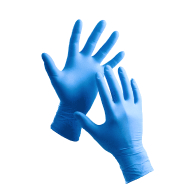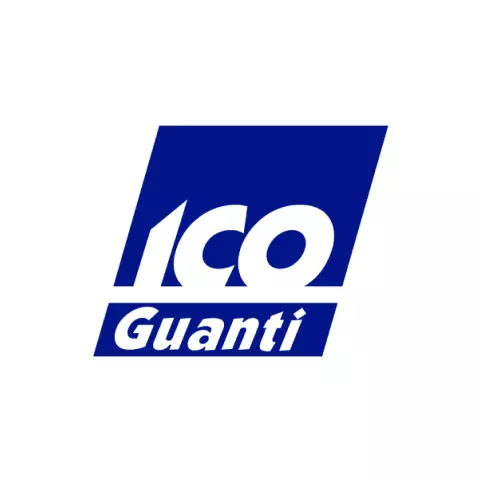Icoguanti PALMPRO 344 Chemical Safety Glove
Product description
Reusable glove in POLYCHLOROPRENE MIX + halogenated NATURAL RUBBER LATEX , anatomically shaped for right and left hand. Internally fleeced, internal antibacterial treatment.
Good chemical resistance to organic acids, alkalis, alcohols, amines, anionic/cationic detergents. Good mechanical characteristics, excellent dexterity, comfort and sensitivity even at low temperatures . Good thermal insulation.
Measures how far the glove extends up the arm, determining protection coverage. Longer lengths shield forearms from chemicals, heat, and other workplace hazards.
The design of the wrist area that secures the glove and prevents debris entry. Different styles offer varying levels of adjustability, protection, and comfort.
Provides complete hand coverage, shielding fingers from hazards. Offers maximum protection and warmth, ideal for demanding tasks and environments.
Suited for various tasks, these gloves offer essential protection and flexibility. A practical choice providing comfort and durability for everyday use.
Defines the texture pattern on contact surfaces that affects traction, control, and handling ability in various work conditions like wet, oily, or dry environments.
The visual appearance that enhances workplace safety through visibility, identification, and hazard awareness while allowing for team differentiation and brand recognition.
The interior fabric that contacts your skin, affecting comfort, temperature regulation, moisture control, and allergen exposure during extended wear periods.
- Chemical Resistance
- Cold Protective
- Cut Resistant
- Slip Resistant
- Antimicrobial Protection
- Hand Protection
Request a free sample
Test first and buy later. Visit any product page to request your free sample.
Standards and labels
EN ISO 21420:2020 is a European standard that sets out the general requirements for hand protection, including comfort, fit, and dexterity.
EN ISO 374-1:2016 is a standard that defines the performance requirements for gloves that protect against chemicals and microorganisms. The standard specifies the design, materials, and testing requirements for gloves to protect against chemicals and microorganisms. Possible test results include measurements of the gloves' permeation resistance, degradation, and penetration. It also includes the safety and functionality requirements for gloves.
Test results
Specified Requirements Type AEN 374-5:2016 is a European standard for gloves that protect against microorganisms, specifically gloves that are used for medical and dental procedures. It sets rules for how the gloves should protect against microorganisms and how to test if they meet the standards. Gloves that pass the tests can have a label that says they meet the standard. The test results can be pass or fail for each test that checks the gloves resistance to microorganisms.
Test results
Micro-organisms VirusEN 374-5:2016 is a standard that outlines the requirements and testing methods for protective gloves designed to protect against viruses. The designation 'Virus' indicates that the gloves have passed specific tests confirming their barrier effectiveness against viruses. These tests involve assessing the glove material's resistance to penetration by blood-borne pathogens and other virus-containing fluids, using a bacteriophage as a surrogate virus due to its small size and resistance. Gloves that meet this standard are vital in healthcare settings, laboratories, and any environment where there is a risk of exposure to viral infections. They are crucial for preventing the transmission of diseases, ensuring that workers are protected when handling potentially infectious materials, thus enhancing safety and health protocols in workplaces with biological hazards.
EN 388:2016 is a European standard for measuring the performance of protective gloves against mechanical risks (abrasion, cut, tear, and puncture). The standard includes test methods and performance requirements for gloves to be considered compliant. Test results are reported using a series of four numbers, each representing the performance level achieved in one of the tests.
Test results
Puncture Resistance Level 0EN 388:2016 specifies safety glove standards, including puncture resistance. The test result Level 0 in puncture resistance indicates that the product does not meet the minimal requirements set by the standard for protecting against punctures. The test method used involves using a standardized stylus with a specified force applied to the glove material. This is measured by the amount of force needed before the stylus punctures through the glove material. A Level 0 result signifies that the glove failed to provide any standardized level of protection during the testing procedure, which means it is not suitable for environments where puncture resistance is required for safety purposes .
Abrasion Resistance Level 3EN 388:2016 is a European standard that provides guidelines for assessing the protection levels of gloves against mechanical risks, such as abrasion, cuts, tears, and puncture. The Abrasion Resistance Level 3 indicates a higher level of protection, signifying that the gloves can resist more intensive wear from rough materials. According to the standard, the abrasion resistance test involves rubbing the glove material against sandpaper under a specified pressure until it is worn through. Level 3 abrasion resistance requires that the gloves withstand 2000 to 7999 cycles of abrasion. This enhanced level of durability is appropriate for tasks involving more frequent or more intense contact with abrasive surfaces, such as construction work, woodworking, and handling building materials. Gloves with Level 3 abrasion resistance offer a robust barrier against wear, extending glove life and providing increased protection for the wearer’s hands, thus reducing the risk of injuries in more demanding work environments.
Cut Resistance, Coup Test Level 1The EN 388:2016 standard is dedicated to gauging the mechanical risks for hand protection where a Cut Resistance, Coup Test Level 1 indicates minimal resistance to cutting because material achieved between 1.2 and 2.5 cycles before being cut through during the test. It means that the product tested at this level offers basic protection against shallow cuts, suitable for tasks with low risk of cut injuries. The test method used involves a rotating circular blade under a fixed force making contact with the fabric or material being tested. The blade moves back and forth across the material until a cut-through is achieved. The number of cycles required to cut through the sample at a consistent speed determines the cut resistance, with Level 1 being the second lowest rating after level 0. Products at this level are applicable in scenarios where there are minimal hazards from sharp objects, hence ideal for light duties where there is no significant risk of deep cuts.
Tear Resistance Level 1EN 388:2016 is a European standard that outlines the testing requirements for gloves to determine their level of protection against mechanical hazards, including tear resistance. The Tear Resistance Level 1 classification signifies that the gloves offer basic protection against tearing. The test method involves applying a force to a sample of the glove material to tear it, and the force measured reflects the glove's ability to resist tearing. Level 1 tear resistance means the gloves can withstand a force of between 10 to 25 Newtons before tearing. This basic level of protection is suitable for tasks where there is a minimal risk of tearing due to light manual handling or where gloves are used to prevent scratches or minor abrasions. Gloves with Level 1 tear resistance are appropriate for general activities that do not involve handling sharp or jagged materials.
Cut Resistance, ISO 13997 Level XThe standard EN 388:2016, specifically its segment referring to ISO 13997 test, is designed to assess the cut resistance of materials used in protective gloves. A result denoted as 'Level X' means that test is not performed and the cut resistance of the product cannot be guaranteed.
ISO 14001:2015 is a standard that specifies requirements for an environmental management system (EMS). It includes requirements for how companies should design, implement, maintain and improve their EMS to ensure that they minimize negative impacts on the environment and comply with environmental regulations. Test results can include information on how well the EMS is functioning, how well it is being followed, and how effective it is in reducing environmental impacts. The standard also includes requirements for how the company should document and record their EMS performance and continuously improve it.
Test results
Environmental Management PassedThe standard ISO 14001:2015 pertains to environmental management systems (EMS). A passed test result under this standard indicates that an organization's EMS meets the stringent criteria set forth for managing environmental responsibilities systematically. This ensures sustainable development while considering environmental impacts. Specifically, ISO 14001:2015 includes requirements for a framework that an organization can follow rather than establishing environmental performance criteria. It encompasses various aspects such as compliance obligations, planning actions to address risks and opportunities, and continual improvement. The test primarily involves evaluating the effectiveness of the EMS in supporting a company to achieve its intended outcomes regarding its environmental performance. If a company has passed this evaluation, it reflects their commitment to environmental stewardship, potentially enhancing their marketability and aiding in compliance with statutory and regulatory requirements.
CE Marking is a label that shows a product meets certain safety and environmental standards set by the European Union. To get the CE Marking, a company must test and certify their product meets these standards. CE Marking is required for many products sold in the EU, including electronics, machinery, toys and medical devices. It helps ensure that products are safe for consumers and the environment, and allows for easy trade within the EU.
PPE stands for "personal protective equipment." PPE Category 3 refers to equipment that is complex and provide the highest level of protection such as powered respirators, SCBA, and full body suits. In Europe, PPE Category 3 must meet certain safety standards set by the European Union, which means that it must be designed and manufactured to protect the user without causing harm. Companies that make or sell PPE must prove that it meets these standards. They also must have a quality management system in place, have to be audited regularly by a notified body and have to have a technical documentation.
Icoguanti delivery terms
Free delivery for all Icoguanti products
60,75 €
Price per 5 packages (50 pairs)
1,22 € / pair
Shipping fee is 6,68 € for orders under 150,00 €
A carton contains 5 packages (50 pairs)
Need larger quantities?
Other products you may like
Recently viewed
Need help?
Get help from our experts
Other products you may like
Similar products you may like
Recommended for you
Icoguanti
Delivery time: 6 business days
Orders from 50,00 €
Supplier shipping fee 6,68 €
Free shipping on orders over 150,00 €



Find +150,000 products from hundreds of brands
Autonomous sourcing platform
The most efficient way to source and order supplies for your operations
Sourcing
Ordering
List products you’re looking for and we’ll find the best products and prices for you – all for free.
Need help?
Get help from our experts
